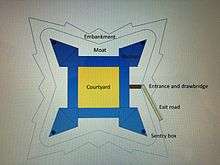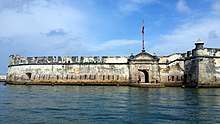Castle of San Luis de Bocachica

The Castle of San Luis de Bocachica, was a military fortress that defended Cartagena in the 17th and 18th centuries. Built by the Spanish during the colonial period.
It is situated in the Island of Tierra Bomba, and controlled the entrance to the Cartagena bay, by the channel of Bocachica (Small Entrance). Its building starts in 1646 by the engineer Juan de Somovilla and its name was related with the governor Luis Fernandez de Cordoba.[1]
The Castle was attacked several times being the most famous, the Raid on Cartagena in 1697 and the Attack on Cartagena in 1741.
During the War of the League of Augsburg, French troops and pirates, attacked the castle the 13th April 1697 and took it the 15th April 1697, but the castle was not destroyed because of the heroic defense of Don Sancho Jimeno and because of the strategic position.
During the War of the Jenkins' Ear, Cartagena was sieged by English troops. The 13th March 1741 the British navy damaged severely the castle and landed troops took it and put it on fire, destroying it completely, during the retreat.[2]

In 1753, building of a new fortress started, the Castle of San Fernando de Bocachica, by the engineer Antonio de Arévalo, over the ruins of the old castle.[3] The fortress was completed in 1759.[4] It continues today as an important tourist attraction.
References
- ↑ "San Luis de Bocachica | Patrimonio de Cartagena". patrimoniodecartagena.com. Retrieved 2016-11-14.
- ↑ Ford, Douglas. Admiral Vernon and the Navy: A Memoir and Vindication, London, MCMVII, p.153.
- ↑ "Don Antonio de Arévalo | banrepcultural.org". banrepcultural.org. Retrieved 2016-11-14.
- ↑ Segovia, Rodolfo (2009). The Fortifications of Cartagena de Indias. Bogota: el Ancora Editores. pp. 86–90. ISBN 9789583601347.
Coordinates: 10°19′10″N 75°34′52″W / 10.319313°N 75.581205°W